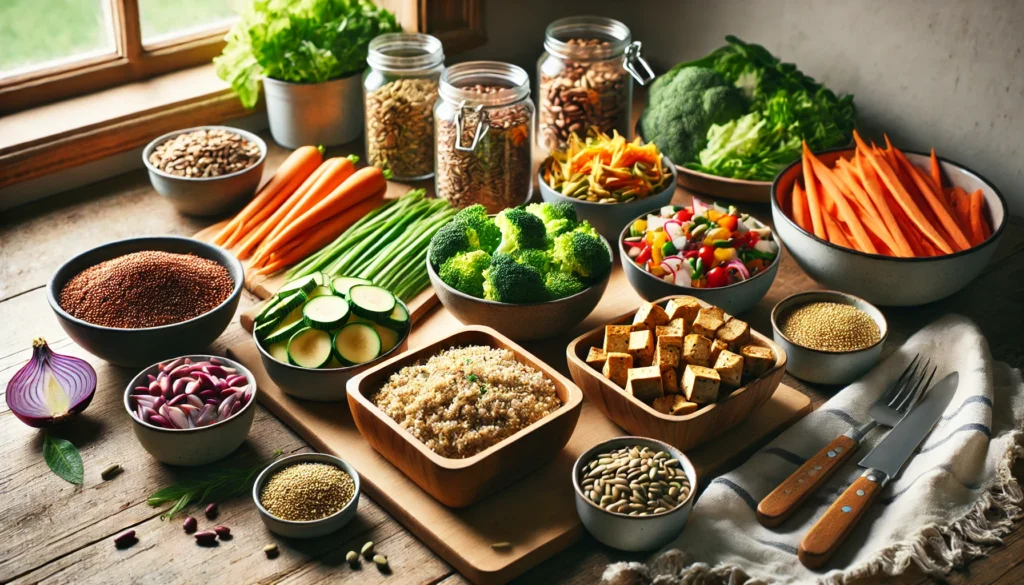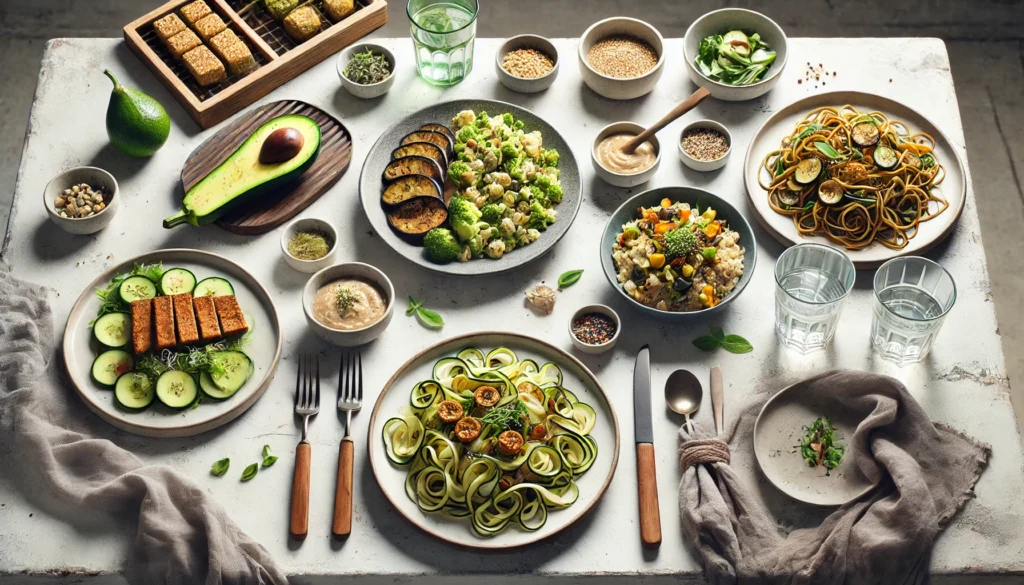Introduction: Understanding the Importance of Protein in a Low Carb Vegetarian Diet
In the ever-evolving world of nutrition, dietary approaches that blend plant-based eating with macronutrient awareness are gaining traction. Among them, the low carb vegetarian diet stands out as a compelling option for individuals seeking to balance protein intake, carbohydrate moderation, and the exclusion of meat. However, one common concern emerges quickly: is it truly possible to get adequate protein while limiting carbs and avoiding animal products? This article explores that very question, offering a science-backed, comprehensive look at the best low carb vegetarian protein sources available today.
You may also like: Best Plant-Based Carbs for Energy and Health: What Science Says About Vegetarian Carbohydrates
Protein is not just a fitness buzzword; it’s an essential macronutrient that plays a critical role in nearly every bodily function. From supporting muscle repair and immune function to serving as the structural foundation of enzymes and hormones, protein is indispensable. For vegetarians and vegans—especially those following a low carb lifestyle—understanding how to meet protein requirements becomes vital for maintaining long-term health and vitality. Many associate plant-based diets with high carbohydrate content, largely due to legumes, grains, and fruits. But not all plant foods are carb-dense, and some plant-based proteins are surprisingly low in carbohydrates.

This discussion is particularly relevant in the context of rising interest in high protein vegan foods low carb. The challenge of reducing carbohydrate intake while ensuring sufficient protein consumption has led researchers and nutritionists to reexamine traditional food groupings and focus on nutrient-dense, low carb vegetarian protein sources. Thankfully, science offers clarity. By drawing upon peer-reviewed research, real-world applications, and practical dietary strategies, this article sheds light on how vegetarians—and especially vegans—can succeed in their health goals without relying on meat or overconsuming carbs.
In what follows, we will dive deep into the foundations of protein needs for vegetarians, explore top non meat high protein low carb foods, and present a curated selection of low carb vegan protein foods that align with whole-food plant-based principles. Whether you’re newly vegetarian, seasoned in plant-based living, or simply experimenting with low carb approaches, the insights in this guide will empower you to nourish your body effectively and confidently.

Frequently Asked Questions: Low Carb Vegetarian Protein Sources
What are some overlooked sources of protein for vegetarians following a low carb plant based diet?
Many people focus on tofu or tempeh, but some overlooked sources of protein for vegetarians low carb include pumpkin seeds, hemp hearts, and lupin flour. Pumpkin seeds, in particular, are rich in both zinc and iron, making them ideal for plant-based eaters aiming for a nutrient-dense diet. Lupin flour, made from lupini beans, contains an exceptionally high protein-to-carb ratio and is gaining traction as a low carb vegan protein food. Incorporating these ingredients into everyday meals can improve both the flavor and nutrient density of a low carb plant based diet. These options broaden the scope of low carb vegetarian protein sources beyond what’s traditionally discussed.
Can athletes build muscle on a high protein low carb vegetarian diet?
Absolutely, and more athletes are now recognizing that high protein low carb vegetarian foods can support muscle repair and growth. By combining strategic resistance training with ample intake of vegan low carb protein sources such as seitan, pea protein, and edamame, muscle synthesis can be maximized without meat. Some athletes also rotate in low carb vegetarian protein foods like cottage cheese (for lacto-vegetarians) and spirulina. Muscle development depends more on the availability of complete proteins and essential amino acids rather than their animal or plant origin. When the right foods are chosen consistently, building muscle with protein for vegetarians low carb is entirely achievable.
What are the best strategies for meal prepping with low carb vegetarian protein foods?
Meal prepping with low carb vegetarian protein sources requires a bit of planning but pays off with ease and efficiency throughout the week. Consider preparing large batches of lentil-free veggie chili with textured vegetable protein (TVP), or make high protein vegan foods low carb by creating flaxseed crackers or hemp-based salad toppers. Use cauliflower rice or shirataki noodles as a low-carb base, then layer with protein-rich veggies like mushrooms, broccoli, and nutritional yeast. Keeping pre-portioned containers of baked tofu, seasoned tempeh, or spiced lupini beans in the fridge also makes quick meals possible. These strategies help sustain a low carb vegetarian protein lifestyle without sacrificing flavor or convenience.
Is it possible to avoid soy and still get enough protein on a low carb vegetarian diet?
Yes, and it’s a common concern, especially for those with allergies or hormonal sensitivities. Fortunately, many non meat high protein low carb foods are soy-free, such as almonds, sunflower seed butter, chia seeds, and plant-based protein powders made from peas or brown rice. Combining these with low carb vegetarian protein foods like seitan or nutritional yeast allows for sufficient daily protein intake. Many brands are now offering vegan low carb protein sources that avoid soy entirely while still providing complete amino acid profiles. With a little creativity, soy-free and high protein low carb vegetarian meals are more accessible than ever.
How does a low carb vegetarian protein approach affect long-term metabolic health?
Research suggests that a low carb plant based diet can improve insulin sensitivity, reduce markers of inflammation, and support weight maintenance. Unlike ketogenic diets based on meat and dairy, the fiber and phytonutrients found in low carb vegan protein foods may enhance metabolic flexibility over time. When protein for vegetarians low carb is derived from nutrient-rich sources, such as nuts, seeds, and legumes in moderation, the diet becomes more sustainable and protective of long-term health. This approach also aligns with emerging trends in personalized nutrition, where plant-forward, low-carb patterns are being tailored to individual needs. The metabolic benefits go beyond weight, touching on heart health, hormone regulation, and cellular aging.
What are the most portable options for low carb vegetarian protein when traveling?
When on the go, it’s important to have easy access to non-perishable, high protein low carb vegetarian foods. Dehydrated edamame, roasted chickpeas, and flaxseed crackers travel well and offer protein for vegetarians low carb without added sugars or fillers. Shelf-stable protein shakes using pea or rice protein are convenient vegan low carb protein sources that fit in a carry-on. Nut butters, especially those made from almonds or macadamias, are compact and energy-dense while keeping carbs minimal. With preparation, maintaining a low carb plant based diet while traveling is not only possible but can be quite simple.
Are there any emerging plant-based ingredients revolutionizing low carb vegetarian protein options?
Yes, ingredient innovation is a growing space in the plant-based world. Fava bean protein and mung bean isolates are two examples of new vegan low carb protein sources appearing in products like egg replacers and meat alternatives. These legumes are naturally low in carbs but high in usable protein, making them ideal for low carb vegetarian protein applications. Fermented plant proteins are also trending, offering increased digestibility and improved amino acid availability. These emerging ingredients may soon reshape how we define high protein vegan foods low carb in both grocery aisles and clinical settings.
What social or psychological factors influence adherence to a low carb vegetarian protein diet?
Many people struggle not with the dietary logistics, but with the social dynamics of restrictive eating. Attending social events, managing cultural food expectations, and navigating restaurant menus can pose challenges for those following a high protein low carb vegetarian lifestyle. The key lies in preparation and confidence—knowing which low carb vegan protein foods are restaurant-friendly, and having answers ready for curious (or critical) family and friends. Emotional resilience also plays a role, particularly when combining dietary restrictions like low carb and meat-free. Building community around shared values and recipes can dramatically improve long-term adherence and satisfaction.
How do I know if I’m getting enough variety with my low carb vegetarian protein sources?
Variety is key to preventing nutrient deficiencies, especially when limiting both carbohydrates and animal products. To diversify, rotate between different low carb vegetarian protein sources each week, including hemp seeds, nuts, algae-based protein powders, and high protein low carb vegetarian staples like tempeh and seitan. Use apps or trackers to monitor your intake of essential amino acids, iron, B12, and zinc, which are particularly relevant on a low carb plant based diet. Exploring international cuisines—like Middle Eastern falafel bowls (without pita) or Thai-inspired almond satay—can also boost variety. Ultimately, a well-planned approach to protein for vegetarians low carb can meet all your nutritional needs with color, texture, and global flavor.
What are some practical signs that your body is thriving on a low carb plant based diet?
Beyond weight loss or muscle gains, thriving on a low carb vegetarian protein plan often means improved mental clarity, steady energy levels, and better blood sugar control. Many people report reduced cravings and a greater sense of satiety when they focus on high protein low carb vegetarian foods that are rich in fiber and healthy fats. Clearer skin, better digestion, and more stable moods can also indicate that your body is adapting well. It’s also worth noting that improvements in lab markers, such as triglycerides, fasting glucose, and hemoglobin A1c, are measurable outcomes linked to this dietary pattern. When low carb vegetarian protein foods are thoughtfully chosen and consistently consumed, the health benefits tend to accumulate over time.

Conclusion: Thriving on a Low Carb Vegetarian Diet with Smart Protein Choices
Achieving nutritional excellence on a low carb plant based diet doesn’t have to feel restrictive or nutritionally incomplete. By understanding how to leverage scientifically supported low carb vegetarian protein sources, you can optimize your health, support muscle maintenance, and enjoy a wide variety of delicious, satisfying meals. The idea that vegetarianism or veganism must inherently rely on carb-heavy foods is outdated. Instead, the emergence of low carb vegetarian protein foods as essential staples in modern diets offers a fresh path forward for those prioritizing both health and sustainability.
With a growing body of evidence supporting the efficacy of high protein low carb vegetarian foods for weight management, metabolic health, and even athletic performance, it’s clear that plant-based living and carbohydrate moderation are not mutually exclusive. From tofu, tempeh, and edamame to hemp seeds, lupini beans, and plant-based protein powders, the spectrum of non meat high protein low carb foods is broader and more exciting than ever. The key lies in education, intentional selection, and consistency.
As we’ve explored throughout this article, there are numerous vegan low carb protein sources that align with both ethical values and health goals. Whether you’re seeking high protein vegan foods low carb for muscle growth or simply looking to reduce your carbohydrate load while maintaining energy and wellness, the tools are well within reach. By staying informed, experimenting in the kitchen, and choosing whole-food, minimally processed options, you can thrive on a diet that supports your body’s needs without compromising on flavor or variety.
Ultimately, protein for vegetarians low carb is not only achievable—it’s a pathway to long-term, vibrant health. With mindful planning and science-backed choices, anyone can enjoy the benefits of a nutrient-rich, plant-based diet that nourishes both body and mind.
Further Reading:
9 High-Protein, Low-Carb Vegetarian Foods
The 18 Best Protein Sources for Vegans and Vegetarians
Foods to eat that are high in protein and low in carbs
plant-based protein options, vegetarian muscle building, low carb nutrition, vegan keto alternatives, protein without meat, healthy plant proteins, vegetarian weight loss, carb-conscious vegetarian, meatless high protein meals, vegan macro balance, low carb food prep, vegetarian fitness diet, protein-rich plant foods, nutrient-dense vegetarian meals, low glycemic plant foods, high protein meal ideas, vegetarian diet planning, muscle gain without meat, vegan meal prep ideas, low carb lifestyle tips
The information contained in this article is provided for general informational purposes only and is not intended to serve as medical, legal, or professional advice. While NewsHealthWatch strives to present accurate, up-to-date, and reliable content, no warranty or guarantee, expressed or implied, is made regarding the completeness, accuracy, or adequacy of the information provided. Readers are strongly advised to seek the guidance of a qualified healthcare provider or other relevant professionals before acting on any information contained in this article. NewsHealthWatch, its authors, editors, and contributors expressly disclaim any liability for any damages, losses, or consequences arising directly or indirectly from the use, interpretation, or reliance on any information presented herein. The views and opinions expressed in this article are those of the author(s) and do not necessarily reflect the official policies or positions of NewsHealthWatch.

